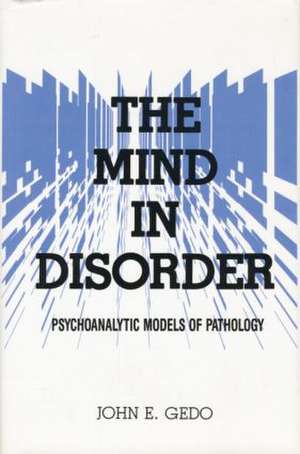The Mind in Disorder: Psychoanalytic Models of Pathology
Autor John E. Gedoen Limba Engleză Paperback – 30 iun 2020
It follwos from Gedo's understanding of how and why the mind becomes disordered, that diagnosis utilizing psychoanalytic principles can only be based on the succession of transference constellations encountered in treatment, since these constellations invariably pinpoint the developmental impasses in which maladaptive repetitive patterns and the failure to learn basic psychological skills are rooted. For purposes of understanding a variety of apraxic and repetitive disorders, Gedo equates such basic skills not only with the three major psychobiological attainments he has invoked in the past, but with the development of adequate perception, cognition, affectivity, and communication skills.
Beautifullu organized, lucidly written, and richly illustrated with case vignettes, The Mind in Disorder is not only the thoughtful yield of an outstanding clinician's three decades of experience. It is also the first psychoanalytic book since Otto Fenichel's masterwork of 1945, The Psychoanalytic Theory of Neurosis, to take the issue of how we conceptualize psychopathology as its central focus.
Preț: 198.18 lei
Preț vechi: 245.87 lei
-19% Nou
Puncte Express: 297
Preț estimativ în valută:
37.92€ • 40.05$ • 31.56£
37.92€ • 40.05$ • 31.56£
Carte tipărită la comandă
Livrare economică 11-25 ianuarie 25
Preluare comenzi: 021 569.72.76
Specificații
ISBN-13: 9781138869523
ISBN-10: 113886952X
Pagini: 264
Dimensiuni: 152 x 229 mm
Greutate: 0.45 kg
Ediția:1
Editura: Taylor & Francis
Colecția Routledge
Locul publicării:Oxford, United Kingdom
ISBN-10: 113886952X
Pagini: 264
Dimensiuni: 152 x 229 mm
Greutate: 0.45 kg
Ediția:1
Editura: Taylor & Francis
Colecția Routledge
Locul publicării:Oxford, United Kingdom
Public țintă
Professional and Professional Practice & DevelopmentCuprins
1. Nosology and the Therapeutic Goals of Psychoanalysis 2. Masochism and the Repetition Compulsion 3. Epigenesis, Regressive Disorganization, and Reversibility 4. Developmental Arrest and the Borders of Integrated Functioning 5. Disruption of the Self-Organization as an Inability to Repeat 6. Regression, the Psychosomatic Barrier, and the Capacity to Symbolize 7. Repetitive Enactment as Symbolization and Self-Healing 8. Transitional Relationships, Adaptive Skills, and Autonomy in Behavior Regulation 9. Character, Dyadic Enactments, and the Need for Symbiosis 10. Transference Neurosis, Archaic Transference, and the Compulsion to Repeat 11. Intractable Character Pathology as the Convergence of Repetition and Apraxia 12. Apraxia and the Inability to Learn: A Reprise of Previous Work 13. Disorders of Communication: Language, Affects, and Vegetative Signs 14. Disorders of Thought: Magic and Obsessions 15. The Conundrum of Sexuality Epilogue: The Art of Psychoanalysis as a Technology of Instruction
Notă biografică
John E. Gedo, M.D., is Training and Supervising Analyst, Chicago Institute for Psychoanalysis, and Clinical Professor of Psychiatry, University of Illinois School of Medicine. He is the author of numerous books, including Conceptual Issues in Psychoanalysis and Portraits of the Artist, both Analytic Press publications.
Recenzii
"[T]he vicissitudes of [Gedo's concepts of apraxia and obligatory repetition] are wide-ranging, complex, richly textured expositions that inform and illuminate at every turn."
- Psychoanalytic Books
- Psychoanalytic Books
Descriere
In this original attempt to chart a theory of disordered mental functions based exclusively on psychoanalytic principles and data, Gedo posits two broad categories of functional disorder: "apraxias," which represent any failure to learn adaptively essent
